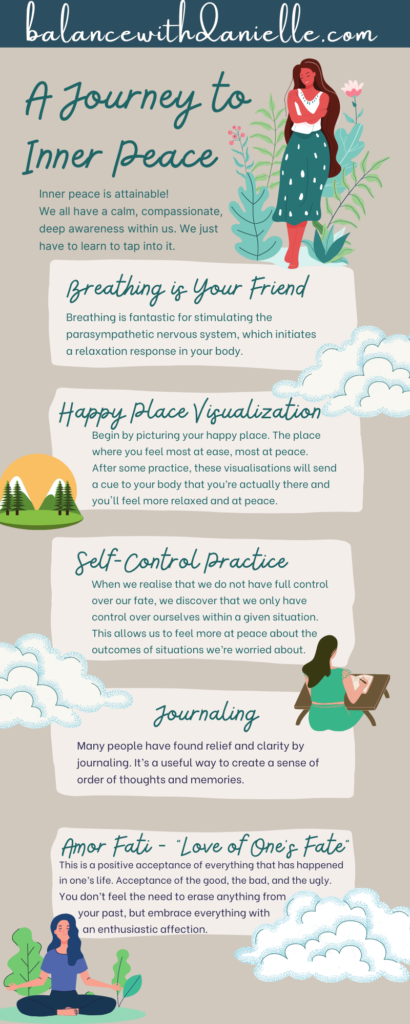
Inner peace is attainable. Believe it or not, you don’t have to spend all day, every day, meditating or become a buddhist monk to find it.
We actually all have a calm, compassionate, deep awareness within us. We just have to learn to tap into it.
Ashley Davis Bush, a psychotherapist and author of The Little Book of Inner Peace: Simple Practices for Less Angst, More Calm, writes that, “You could be on a New York city subway, surrounded by people and noise, and close your eyes to go into this space where your calmness resides.”
There are a few ways we can harness our inner peace. I’ve broken it down into 10 easy practices to help guide you on your journey!
1. Breathing is Your Friend
After experiencing a panic attack (or 5), I’ve learned that one of the best ways to calm the parasympathetic nervous system is breathing. When my breath gets fast in that state, I slow it right down.
There are so many brilliant breathing techniques you can implement to slow your heart rate down, either during a panic attack or if you just need to relax.
One method I use is called ‘box breathing’. Imagine four lines of a 2D box. As you inhale you mentally draw a line up, exhale – draw the line across, inhale – down, exhale – across. And continue. It’s that easy!!
Sometimes I outline objects in front of me as I breathe like a car, a tree, whatever you like!
An effective way to practice mindful breathing is to close your mouth and breathe in through the nose. Hold at the top of your breath… and breathe out through your mouth.
This type of breathing is fantastic for stimulating the parasympathetic nervous system, which is basically initiating a relaxation response in your body.
I use a lot of this breathing in my meditations if you’d like to check them out here!

2. Visualisation
“Begin each day by telling yourself: Today I shall be meeting with interference, ingratitude, insolence, disloyalty, ill-will, and selfishness – all of them due to the offenders’ ignorance of what is good or evil.” – Marcus Aurelius
By visualising negativity combined with an accepting attitude, Roman Emperor and philosopher Marcus Aurelius managed his expectations and shielded his soul against adversity.
Remember, every day you will probably encounter some negativity. It usually takes the form of another person. If someone is nasty, they just don’t know any better. But you do!
And if you decide to not let them affect your day negatively, these negative people cannot bother nor influence your day.

3. Happy Place Visualisation
Visualisations are brilliant when done in a guided meditation so you can put all your focus into your happy place.
Take some time. When you’re in a relaxed state, begin to picture your happy place. The place where you feel most at ease, most at peace.
Notice how you feel, and tap into your senses. What do you see? What do you hear? What do you smell?
These visualisations will get stronger and more vivid at times and will send a cue to your body that you’re actually there and feeling more relaxed and at peace. This is a great way to harness your own inner peace!

4. Self-Control Practice
“Things in our control are opinion, pursuit, desire, aversion and in a word, whatever are our own actions. Things not in our control are body, property, reputation, command and in one word, whatever are not our actions” – Epictetus
When we don’t act on every impulse, we gain more self control.
There are a number of ways you can strengthen your self-control. Intermittent fasting, avoiding decision fatigue, limiting digital media or pushing yourself harder, and doing a few extra reps of an exercise before giving up.
When we realise that we do not have full control over our fate, we discover that we only have control over ourselves within a given situation. This allows us to feel more at peace about the outcomes of situations we’re worried about.

5. Letting Go of What Other People Think
In this day and age, social media gives everyone an online pedestal which they can show how glamorous their lives are. This makes it harder and harder to be ourselves if we’re constantly trying to prove our happiness and success to everyone.
One of the best things I have ever done to silence my ego and get closer to myself was deleting my personal Instagram and other social media accounts. Almost instantly, I began to care less and less about what other people thought of me.
“What other people say about you is none of your business.”
The reality is that people are always going to have something to say about someone and there will always be others trying to drag others down.
The solution?
Give up caring what other people think and just be yourself.
If you’re worried about what someone you know might be saying or thinking about you, why should you value their opinion in the first place?
Because of our social conditioning, it is hard to break this habit. The fear of social ostracism is deeply ingrained in us.
If you feel like you have to be somebody else to fit into your group of friends, maybe it’s time to start looking for a new tribe.
Don’t worry, there are over 7.6 billion of us! Plus, the friendships you develop where you feel comfortable to be yourself, without judgement are much more rewarding and peaceful.
Be yourself, embrace the giggles, and just go with it!

6. Journaling
Humans have been jotting down our thoughts well before the ancient Roman Marcus Aurelius was writing his philosophical legacy.
Many other greats have found relief and clarity by journaling. It’s a useful way to create a sense of order of thoughts and memories. And has been known to have cathartic thoughts in the mind.
I’ve had journals since I was a kid, and wow are they a laugh to look back on now!
If you don’t know where to begin, just begin an entry with how you are currently feeling in this present moment and let it flow. You’ll be surprised how much easier it is to rationalise your thoughts when you see them written on a page!

7. Memento Morie
Memento Morie is Latin and translates to, “remember that you have to die.”
We all shy away from the thought of death because we couldn’t imagine such a horrible thing! However, when we think about our own death, it can put our lives into perspective that time’s a-tickin and we should get out there and live every day like it’s our last. “Carpe diem!”
After I very luckily survived a near-fatal car crash, I took a look at my life and decided to change it for the better. Previously an adrenaline junkie, this new sense of how lucky I was to be alive drove in a few positive traits including gratitude, fulfilling my purpose, and caring less about the unimportant things.
Thinking about death should not evoke fear but gratitude and appreciation for the life that has been given to us.
“Let us prepare our minds as if we’d come to the very end of life. Let us postpone nothing, let us balance life’s books each day. The one who puts the finishing touches on their life each day is never short of time.” – Lucius Annaeus, Roman Stoic philosopher.

8. A.C.T for Peace
Kristen Neff, a prominent researcher in the field of self-compassion, developed A.C.T. to inspire people to treat themselves with compassion.
Acknowledge
First, acknowledge what you’re going through. Say to yourself, “I know I’m going through this right now, and it’s difficult.”
Connect
Connect to others and remember that you are not alone in your suffering. Everybody gets angry, frustrated, and has tough times.
Talk
Talk with compassion to yourself. “I know this is hard right now but you are doing so well, and you can get through this!”
This might not be the easiest at the beginning.
I remember when I first tried to say positive affirmations in the mirror and I crippled with cringe, refusing to look at myself.
But being kinder to myself has been so rewarding. That voice in my head no longer berates me but is my own little cheerleader!

9. Reflection
At the end of each day, ask yourself:
- How was my day?
- What was good about my day?
- Is there anything I could have done differently?
I find that doing this at the end of my day makes me realise that there is a lot to be grateful for.
It also stops me from ruminating late at night, stopping me from going to sleep because I’ve already gotten it out.
Also, incorporate these questions into your journaling. It’s great to look back and see how far you’ve come!

10. Amor Fati
One of the strangest yet most intriguing aspects of Friedrich Nietzsche’s ideas is his repeated enthusiasm for the concept of ‘amor fati’. Translated from Latin, it means a ‘love of one’s fate’.
This is a positive acceptance of everything that has happened in one’s life. Acceptance of the good, the bad and the ugly.
When one has ‘amor fati’, they don’t feel the need to erase anything from their past but embrace their downfalls with a strength and gratitude that borders on a kind of enthusiastic affection.
We’ve all been kept up at night remembering that horrendously embarrassing thing that our mind decides to dish to us while trying to go to sleep. I struggled with punishing myself for how I acted in the past for quite some time when I first began my journey.
But I learned that I wouldn’t be the person that I am today without everything that I’d gone through in the past. I can now look back at younger, reckless Danielle and laugh. Because she has grown into a centered, wise, strong young woman which I am oh-so proud of!

Keep Growing & Loving












0 Comments